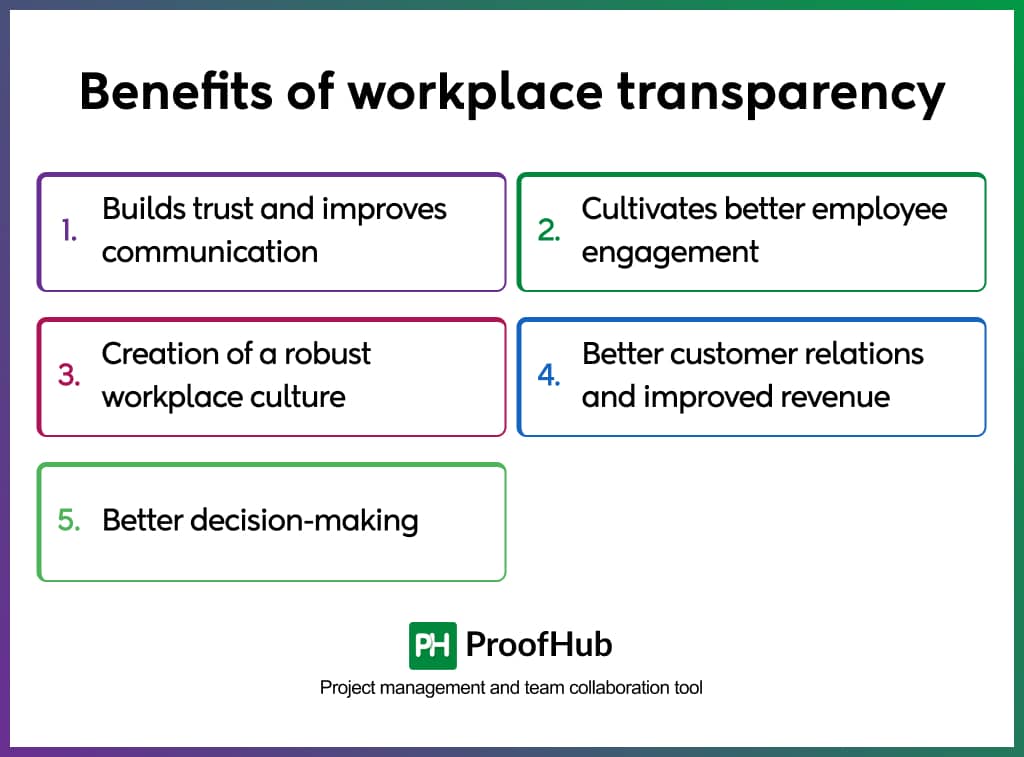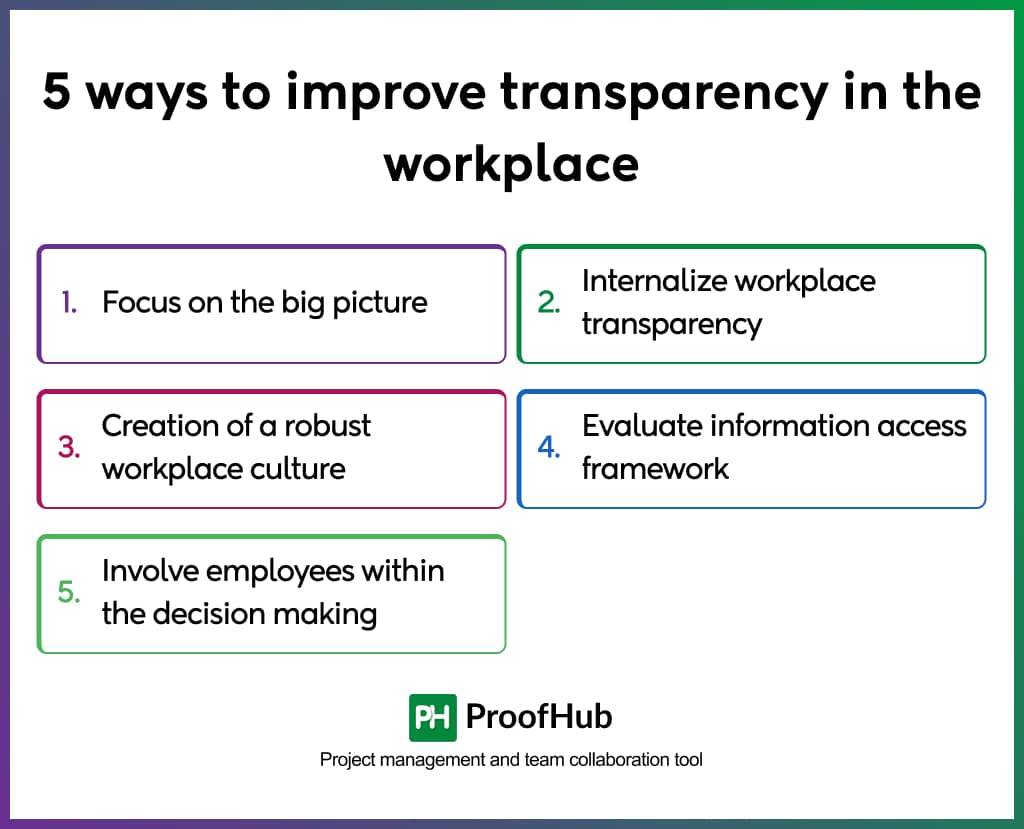Teamwork is the bedrock of success in any field of collaborative work. A company’s success and prosperity are directly linked to the level of trust among the people who make the company.
Trusting your colleagues enables unprecedented levels of employee engagement and productivity. But the question is, how do you build that trust? The answer is deceptively simple and can be summed up in a single word; “workplace transparency”.
The lack of trust in the workplace correlates to the lack of transparency. Ergo, it is simple to understand that if you cultivate openness in the workplace, then that will result in the creation of a highly productive, collaborative, and conducive work environment.
In this article, we will understand the importance, pros, and cons, along with a step-by-step method to implement workplace transparency within your organization.
What is workplace transparency?
Workplace transparency is a systematic approach to openly sharing information within an organization. It can be decision-making, company performance, and policies.
This information-sharing aims to benefit the company and its employees by building trust and promoting a collaborative, engaged, and productive work environment.
An honest and open two-way communication channel between team members and management (even if you work remotely) is the best example of a transparent work environment.
Why is workplace transparency important?
A transparent work environment lays a strong foundation of trust and relationships between an organization and its employees. Here is why transparency in the workplace is important, as it:
- Builds trust among employees
- Enhances communication
- It can lead to better decision-making
- Improves productivity
- Employees are more engaged and motivated
- Fosters environment of collaboration and innovation
- The goals of employees are aligned with the organization’s goals
Managers can operate transparently by ensuring that their employees are regularly informed about company matters. To improve and maintain a transparent culture, everyone must work together.
What are the benefits of workplace transparency?

The successful implementation of a robust workplace transparency framework can create many advantageous situations for companies.
Here is a breakdown of all the significant advantages of a transparent workplace:
1. Builds trust and improves communication
A transparent work environment enables you to build trust and improve internal communication. Good workplace relationships include decent individual interactions within the organization.
A transparent workplace allows you to make your employees feel respected and heard, which results in them feeling valued.
When you make sure that your company has the proper levels of workplace transparency manually or via team collaboration tools, you will see an increase in overall team happiness & satisfaction.
2. Cultivates better employee engagement
The excellent implementation of methodical workplace transparency allows for higher employee engagement. The increase in employee engagement is due to fulfilling the two fundamental pillars essential for employee engagement; “employee recognition and satisfaction”.
High levels of employee engagement are critical factors in a productive and effective workplace. If your employees feel that their work has a positive, meaningful, and tangible impact on the company, they are intrinsically more likely to work harder. On top of that, they will be much more likely to remain loyal and innovative in their work.
3. Creation of a robust workplace culture
Your company’s active effort to implement a transparent knowledge & information sharing culture across the organization enables the creation of a robust workplace culture. It allows your employees to see that the management trusts their employees and respects and values their contributions. It is the fundamental role of leaders of the company to set a precedent of what is expected of all employees across the organization regarding a transparent workplace culture.
4. Better customer relations and improved revenue
All of the above benefits have a snowball effect on your employees. Because your employees are concerned about your company’s performance, the above benefits translate into stronger customer interactions that foster better customer relations. Trusted and appreciated employees are more likely to want their company to succeed.
Not only that, but transparency in the workplace has a cascading impact that affects your bottom line. Employee engagement, effective communication, and excellent customer service will help you overcome any challenges your company will experience as it grows. You may establish and improve your firm and progressively increase its revenue with fewer obligations and challenges.
5. Better decision-making
Transparency in the workplace fosters a culture of informed decision-making. When employees are aware of the bigger picture and the reasons behind decisions, they can contribute more effectively. This coordinated input leads to more thoughtful and strategic outcomes.
5 ways to improve transparency in the workplace

Now the question is; how can you cultivate workplace transparency? The action must be taken top-down to create a transparent work culture. Managers and executives will be crucial in crafting your organization’s culture and work environment.
The following are the top five ways management can encourage a culture of transparency within the workplace:
1. Focus on the big picture
Firstly, always have a long-term vision and mission statement for your business. This way, you reduce the chances of your company losing its steam during good and bad times. On the other hand, having a vision for the future also allows you to look at the big picture and adjust your course of action based on actual-world developments such as a pandemic. Understanding the type of transparency and how much of it you need within your organization will be dictated by the big picture vis-a-vis your business.
2. Internalize workplace transparency
Radical changes need to be made for rapid growth; hence the most crucial step any manager can take to become more transparent is to include transparency in the company’s policy. This will convey that you are a true leader who cares about your team.
Take these steps to implement transparency inside your department or team if you don’t have enough authority to do it company-wide. Hold a special workshop where you and your colleagues may explore what transparency is, why it is essential, and what steps can be taken to adopt it in the workplace.
3. Allow employees to ask questions
Coworkers and employees should be able to ask you whatever questions they want or need. It would help if you created a safe space for your employees and coworkers to be vulnerable with you and each other. People may be able to ask questions that they would not usually be able to ask due to the fear of rejection or, worse, humiliation.
4. Evaluate your company’s information access framework
It would help if you evaluated how your company deals with sharing information within its different departments, teams, and employees.
The desire to maintain complete control by the upper management can lead to different departments and teams being siloed into small boxes of their required field of work. This restricts the sharing of ideas and information, resulting in the stagnation of innovation.
To cultivate a more transparent working environment, you must focus on creating SOPs that enable a framework to exist that allows for stellar intra-company collaboration.
5. Involve employees within the decision making command-structure
It’s always better to include your team members in the decision-making process rather than discussing your decisions. You can accomplish it in a variety of ways, for example, by conducting a brief poll on a topic. You will receive feedback from others, and in certain situations, a brainstorming session or workshop may be held to identify collaborative solutions.
You’ll become more transparent as a leader due to this decision-making technique, and you’ll be able to make better judgments for your firm.
Build a transparent work environment with ProofHub
ProofHub is much more than a simple project management tool; it has been designed & developed from the ground up to make management & collaboration a breeze.
The primary goal of ProofHub is to aid in the creation of a complete digital workplace that brings all aspects of your organization to the cloud and enables better collaboration, enhanced productivity, easier management, and optimized operations.
Using the right tools is one of the most critical aspects of creating workplace transparency. ProofHub’s features like; “chat, discussions, proofing, time tracking, etc., allow for the entire team to be on the same page and reduce discrepancies between team members enabling them to collaborate better.
ProofHub offers a centralized dashboard console where you can track and manage all your projects from a bird’s eye view. Project managers can not only learn what their team members are working on but also know how much of it is done or how much time it would take to complete it.
ProofHub enables you to foster robust communication and collaboration regardless of physical limitations like distance or time zones. The platform’s broad range of features makes managing tasks and people a piece of cake.
You can define project milestones, set task dependencies and subtasks, add file sharing, do online proofing, chat, and much more to keep the team united and working in the same spirit to enable an open, transparent, and healthy working environment.
If you hit a hurdle while using ProofHub, it has one of the most proactive support teams on the market. You can always reach out to the customer support team or refer to the support page for any relevant query or concern about the platform.
Conclusion
Workplace transparency leads to a workforce that is not only happier and much more productive and engaged with their work. But at the same time, it is exceptionally loyal and brimming with great potential and an innovative spirit.
While you immerse yourself in the process of creating a transparent work environment, you will be dedicated to your company’s unique needs and requirements. The fundamental truth will always remain the same; “trust is not given; it is earned.”

